Business Development Case Study: ABC Learning Ltd Collapse
VerifiedAdded on 2023/06/06
|7
|2061
|213
Case Study
AI Summary
This case study analyzes the rise and fall of ABC Learning Ltd, a childcare provider that expanded rapidly before collapsing due to a series of ethical and corporate governance failures. The case examines issues such as lack of transparency, manipulated accounts, poor management decisions, opaque operations, related-party transactions, and poor strategic planning, including aggressive international expansion. The study highlights the role of business ethics and corporate social responsibility, specifically focusing on how the company's unethical practices, including false accounting information and inadequate corporate governance systems, contributed to its downfall. The analysis also explores the role of auditors, the lessons learned from the collapse, and the importance of proper revenue recognition, a focus on core objectives, effective corporate governance, and maintaining healthy financial accounts. The case underscores the need for organizations to carefully analyze both internal and external factors, prioritize ethical behavior, and conduct thorough risk assessments to avoid similar failures.
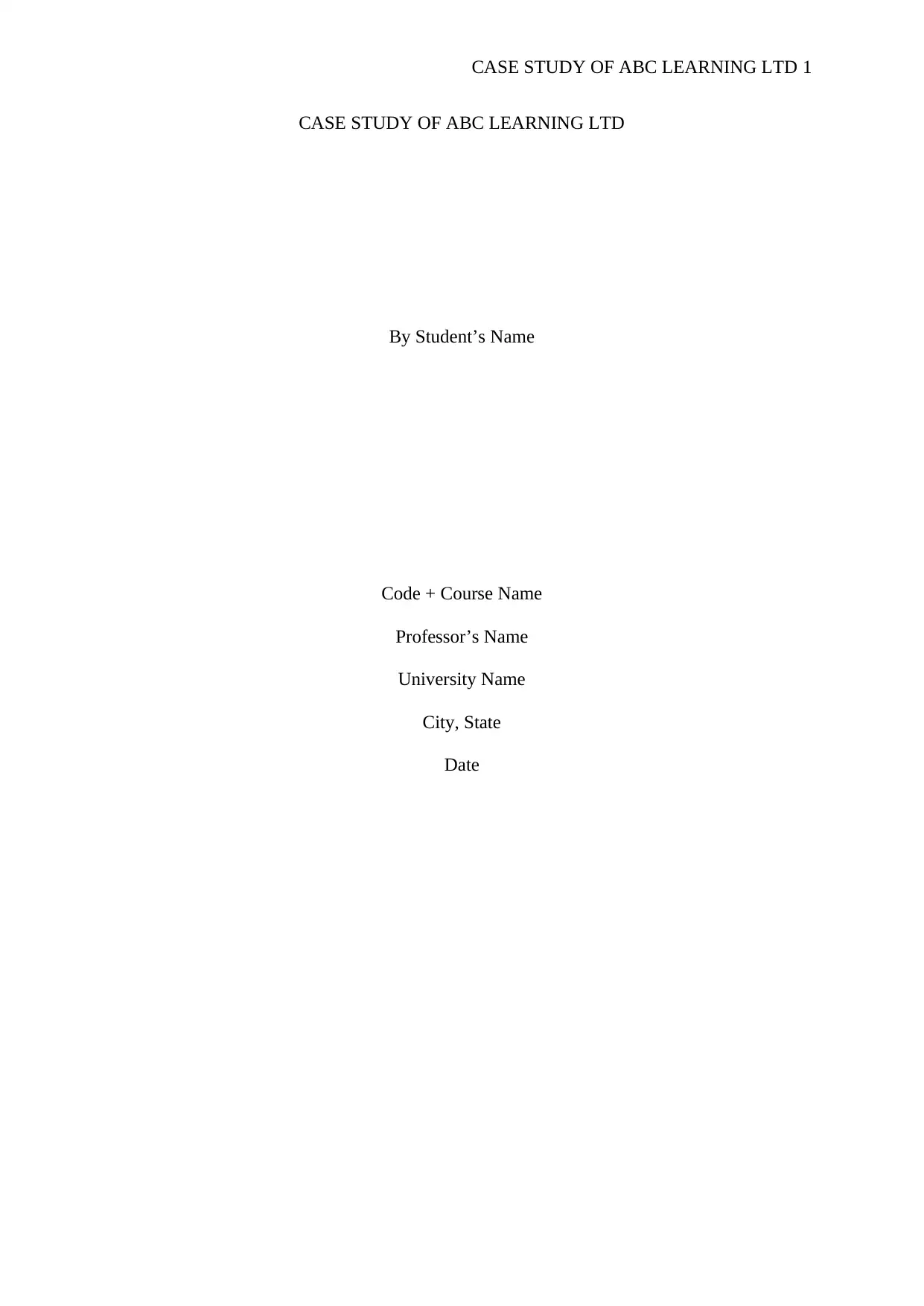
CASE STUDY OF ABC LEARNING LTD 1
CASE STUDY OF ABC LEARNING LTD
By Student’s Name
Code + Course Name
Professor’s Name
University Name
City, State
Date
CASE STUDY OF ABC LEARNING LTD
By Student’s Name
Code + Course Name
Professor’s Name
University Name
City, State
Date
Paraphrase This Document
Need a fresh take? Get an instant paraphrase of this document with our AI Paraphraser
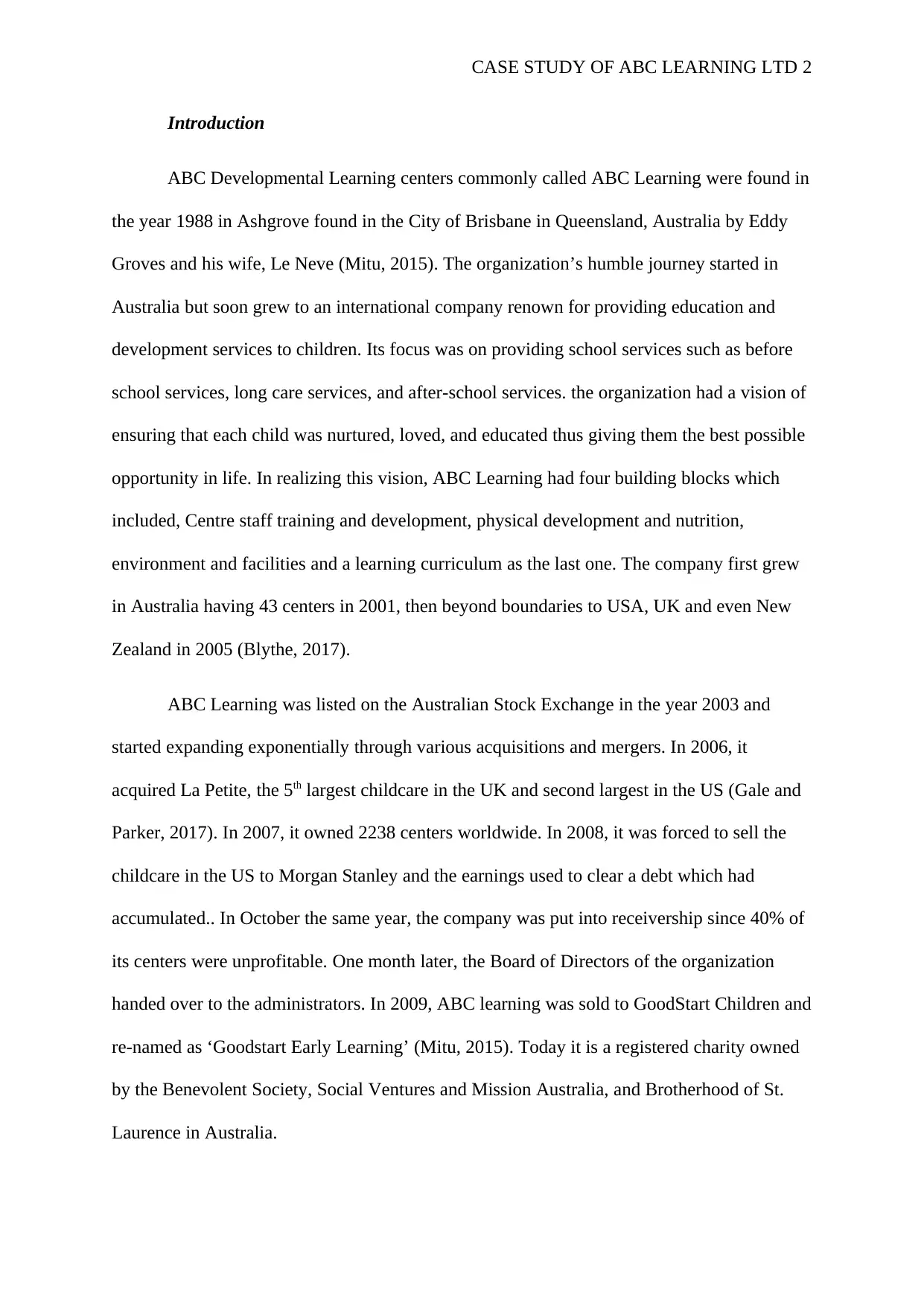
CASE STUDY OF ABC LEARNING LTD 2
Introduction
ABC Developmental Learning centers commonly called ABC Learning were found in
the year 1988 in Ashgrove found in the City of Brisbane in Queensland, Australia by Eddy
Groves and his wife, Le Neve (Mitu, 2015). The organization’s humble journey started in
Australia but soon grew to an international company renown for providing education and
development services to children. Its focus was on providing school services such as before
school services, long care services, and after-school services. the organization had a vision of
ensuring that each child was nurtured, loved, and educated thus giving them the best possible
opportunity in life. In realizing this vision, ABC Learning had four building blocks which
included, Centre staff training and development, physical development and nutrition,
environment and facilities and a learning curriculum as the last one. The company first grew
in Australia having 43 centers in 2001, then beyond boundaries to USA, UK and even New
Zealand in 2005 (Blythe, 2017).
ABC Learning was listed on the Australian Stock Exchange in the year 2003 and
started expanding exponentially through various acquisitions and mergers. In 2006, it
acquired La Petite, the 5th largest childcare in the UK and second largest in the US (Gale and
Parker, 2017). In 2007, it owned 2238 centers worldwide. In 2008, it was forced to sell the
childcare in the US to Morgan Stanley and the earnings used to clear a debt which had
accumulated.. In October the same year, the company was put into receivership since 40% of
its centers were unprofitable. One month later, the Board of Directors of the organization
handed over to the administrators. In 2009, ABC learning was sold to GoodStart Children and
re-named as ‘Goodstart Early Learning’ (Mitu, 2015). Today it is a registered charity owned
by the Benevolent Society, Social Ventures and Mission Australia, and Brotherhood of St.
Laurence in Australia.
Introduction
ABC Developmental Learning centers commonly called ABC Learning were found in
the year 1988 in Ashgrove found in the City of Brisbane in Queensland, Australia by Eddy
Groves and his wife, Le Neve (Mitu, 2015). The organization’s humble journey started in
Australia but soon grew to an international company renown for providing education and
development services to children. Its focus was on providing school services such as before
school services, long care services, and after-school services. the organization had a vision of
ensuring that each child was nurtured, loved, and educated thus giving them the best possible
opportunity in life. In realizing this vision, ABC Learning had four building blocks which
included, Centre staff training and development, physical development and nutrition,
environment and facilities and a learning curriculum as the last one. The company first grew
in Australia having 43 centers in 2001, then beyond boundaries to USA, UK and even New
Zealand in 2005 (Blythe, 2017).
ABC Learning was listed on the Australian Stock Exchange in the year 2003 and
started expanding exponentially through various acquisitions and mergers. In 2006, it
acquired La Petite, the 5th largest childcare in the UK and second largest in the US (Gale and
Parker, 2017). In 2007, it owned 2238 centers worldwide. In 2008, it was forced to sell the
childcare in the US to Morgan Stanley and the earnings used to clear a debt which had
accumulated.. In October the same year, the company was put into receivership since 40% of
its centers were unprofitable. One month later, the Board of Directors of the organization
handed over to the administrators. In 2009, ABC learning was sold to GoodStart Children and
re-named as ‘Goodstart Early Learning’ (Mitu, 2015). Today it is a registered charity owned
by the Benevolent Society, Social Ventures and Mission Australia, and Brotherhood of St.
Laurence in Australia.
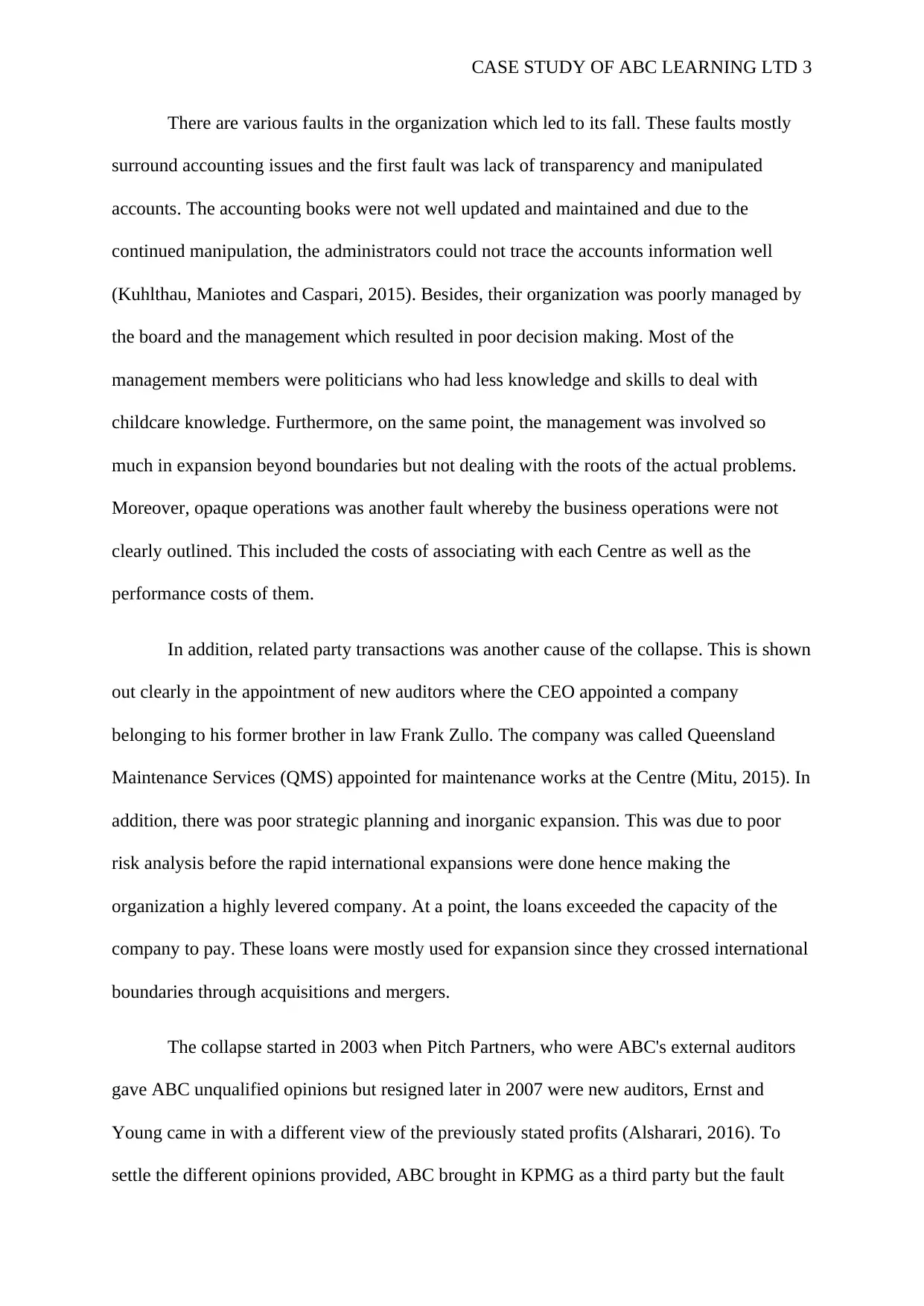
CASE STUDY OF ABC LEARNING LTD 3
There are various faults in the organization which led to its fall. These faults mostly
surround accounting issues and the first fault was lack of transparency and manipulated
accounts. The accounting books were not well updated and maintained and due to the
continued manipulation, the administrators could not trace the accounts information well
(Kuhlthau, Maniotes and Caspari, 2015). Besides, their organization was poorly managed by
the board and the management which resulted in poor decision making. Most of the
management members were politicians who had less knowledge and skills to deal with
childcare knowledge. Furthermore, on the same point, the management was involved so
much in expansion beyond boundaries but not dealing with the roots of the actual problems.
Moreover, opaque operations was another fault whereby the business operations were not
clearly outlined. This included the costs of associating with each Centre as well as the
performance costs of them.
In addition, related party transactions was another cause of the collapse. This is shown
out clearly in the appointment of new auditors where the CEO appointed a company
belonging to his former brother in law Frank Zullo. The company was called Queensland
Maintenance Services (QMS) appointed for maintenance works at the Centre (Mitu, 2015). In
addition, there was poor strategic planning and inorganic expansion. This was due to poor
risk analysis before the rapid international expansions were done hence making the
organization a highly levered company. At a point, the loans exceeded the capacity of the
company to pay. These loans were mostly used for expansion since they crossed international
boundaries through acquisitions and mergers.
The collapse started in 2003 when Pitch Partners, who were ABC's external auditors
gave ABC unqualified opinions but resigned later in 2007 were new auditors, Ernst and
Young came in with a different view of the previously stated profits (Alsharari, 2016). To
settle the different opinions provided, ABC brought in KPMG as a third party but the fault
There are various faults in the organization which led to its fall. These faults mostly
surround accounting issues and the first fault was lack of transparency and manipulated
accounts. The accounting books were not well updated and maintained and due to the
continued manipulation, the administrators could not trace the accounts information well
(Kuhlthau, Maniotes and Caspari, 2015). Besides, their organization was poorly managed by
the board and the management which resulted in poor decision making. Most of the
management members were politicians who had less knowledge and skills to deal with
childcare knowledge. Furthermore, on the same point, the management was involved so
much in expansion beyond boundaries but not dealing with the roots of the actual problems.
Moreover, opaque operations was another fault whereby the business operations were not
clearly outlined. This included the costs of associating with each Centre as well as the
performance costs of them.
In addition, related party transactions was another cause of the collapse. This is shown
out clearly in the appointment of new auditors where the CEO appointed a company
belonging to his former brother in law Frank Zullo. The company was called Queensland
Maintenance Services (QMS) appointed for maintenance works at the Centre (Mitu, 2015). In
addition, there was poor strategic planning and inorganic expansion. This was due to poor
risk analysis before the rapid international expansions were done hence making the
organization a highly levered company. At a point, the loans exceeded the capacity of the
company to pay. These loans were mostly used for expansion since they crossed international
boundaries through acquisitions and mergers.
The collapse started in 2003 when Pitch Partners, who were ABC's external auditors
gave ABC unqualified opinions but resigned later in 2007 were new auditors, Ernst and
Young came in with a different view of the previously stated profits (Alsharari, 2016). To
settle the different opinions provided, ABC brought in KPMG as a third party but the fault
⊘ This is a preview!⊘
Do you want full access?
Subscribe today to unlock all pages.

Trusted by 1+ million students worldwide
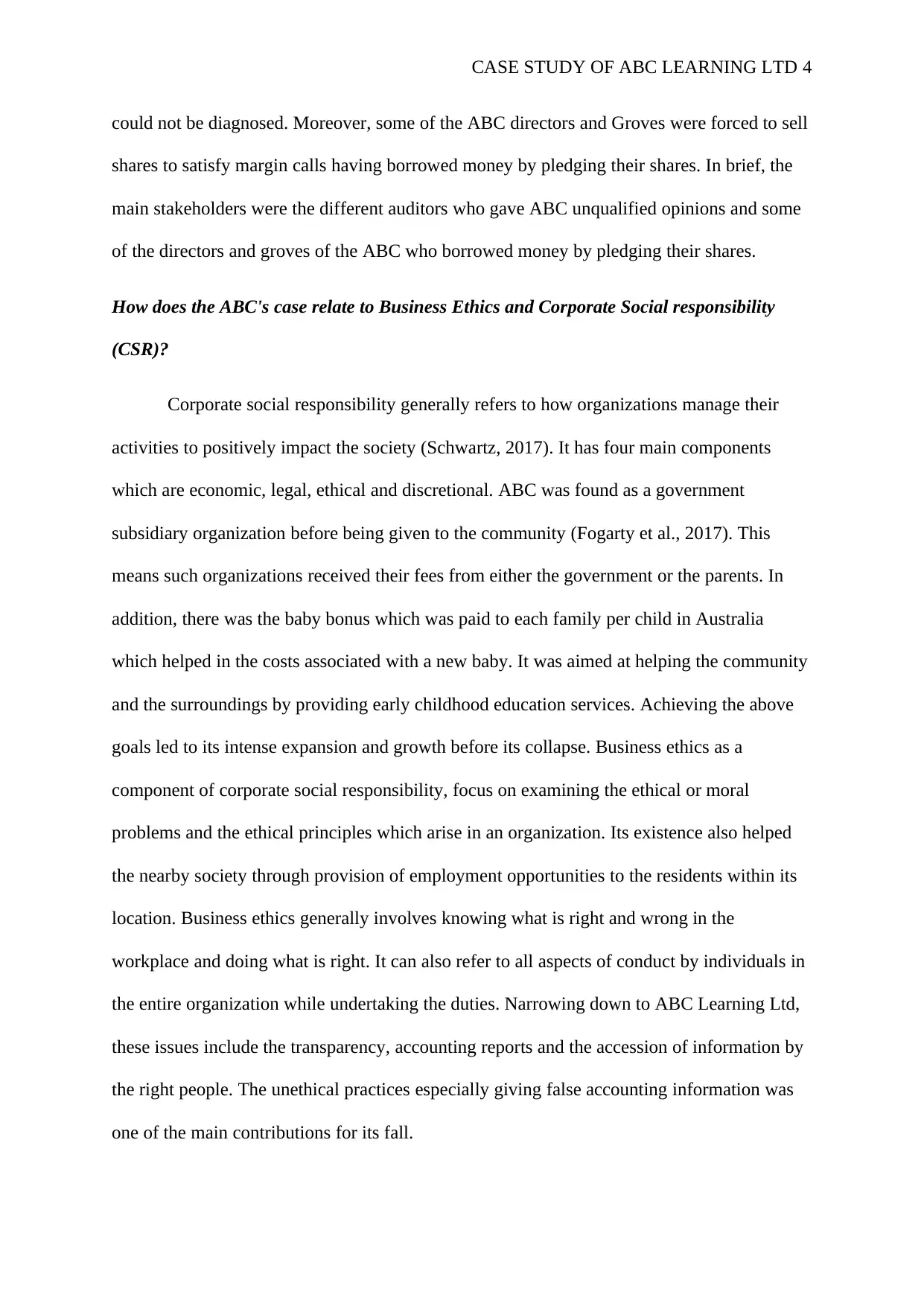
CASE STUDY OF ABC LEARNING LTD 4
could not be diagnosed. Moreover, some of the ABC directors and Groves were forced to sell
shares to satisfy margin calls having borrowed money by pledging their shares. In brief, the
main stakeholders were the different auditors who gave ABC unqualified opinions and some
of the directors and groves of the ABC who borrowed money by pledging their shares.
How does the ABC's case relate to Business Ethics and Corporate Social responsibility
(CSR)?
Corporate social responsibility generally refers to how organizations manage their
activities to positively impact the society (Schwartz, 2017). It has four main components
which are economic, legal, ethical and discretional. ABC was found as a government
subsidiary organization before being given to the community (Fogarty et al., 2017). This
means such organizations received their fees from either the government or the parents. In
addition, there was the baby bonus which was paid to each family per child in Australia
which helped in the costs associated with a new baby. It was aimed at helping the community
and the surroundings by providing early childhood education services. Achieving the above
goals led to its intense expansion and growth before its collapse. Business ethics as a
component of corporate social responsibility, focus on examining the ethical or moral
problems and the ethical principles which arise in an organization. Its existence also helped
the nearby society through provision of employment opportunities to the residents within its
location. Business ethics generally involves knowing what is right and wrong in the
workplace and doing what is right. It can also refer to all aspects of conduct by individuals in
the entire organization while undertaking the duties. Narrowing down to ABC Learning Ltd,
these issues include the transparency, accounting reports and the accession of information by
the right people. The unethical practices especially giving false accounting information was
one of the main contributions for its fall.
could not be diagnosed. Moreover, some of the ABC directors and Groves were forced to sell
shares to satisfy margin calls having borrowed money by pledging their shares. In brief, the
main stakeholders were the different auditors who gave ABC unqualified opinions and some
of the directors and groves of the ABC who borrowed money by pledging their shares.
How does the ABC's case relate to Business Ethics and Corporate Social responsibility
(CSR)?
Corporate social responsibility generally refers to how organizations manage their
activities to positively impact the society (Schwartz, 2017). It has four main components
which are economic, legal, ethical and discretional. ABC was found as a government
subsidiary organization before being given to the community (Fogarty et al., 2017). This
means such organizations received their fees from either the government or the parents. In
addition, there was the baby bonus which was paid to each family per child in Australia
which helped in the costs associated with a new baby. It was aimed at helping the community
and the surroundings by providing early childhood education services. Achieving the above
goals led to its intense expansion and growth before its collapse. Business ethics as a
component of corporate social responsibility, focus on examining the ethical or moral
problems and the ethical principles which arise in an organization. Its existence also helped
the nearby society through provision of employment opportunities to the residents within its
location. Business ethics generally involves knowing what is right and wrong in the
workplace and doing what is right. It can also refer to all aspects of conduct by individuals in
the entire organization while undertaking the duties. Narrowing down to ABC Learning Ltd,
these issues include the transparency, accounting reports and the accession of information by
the right people. The unethical practices especially giving false accounting information was
one of the main contributions for its fall.
Paraphrase This Document
Need a fresh take? Get an instant paraphrase of this document with our AI Paraphraser
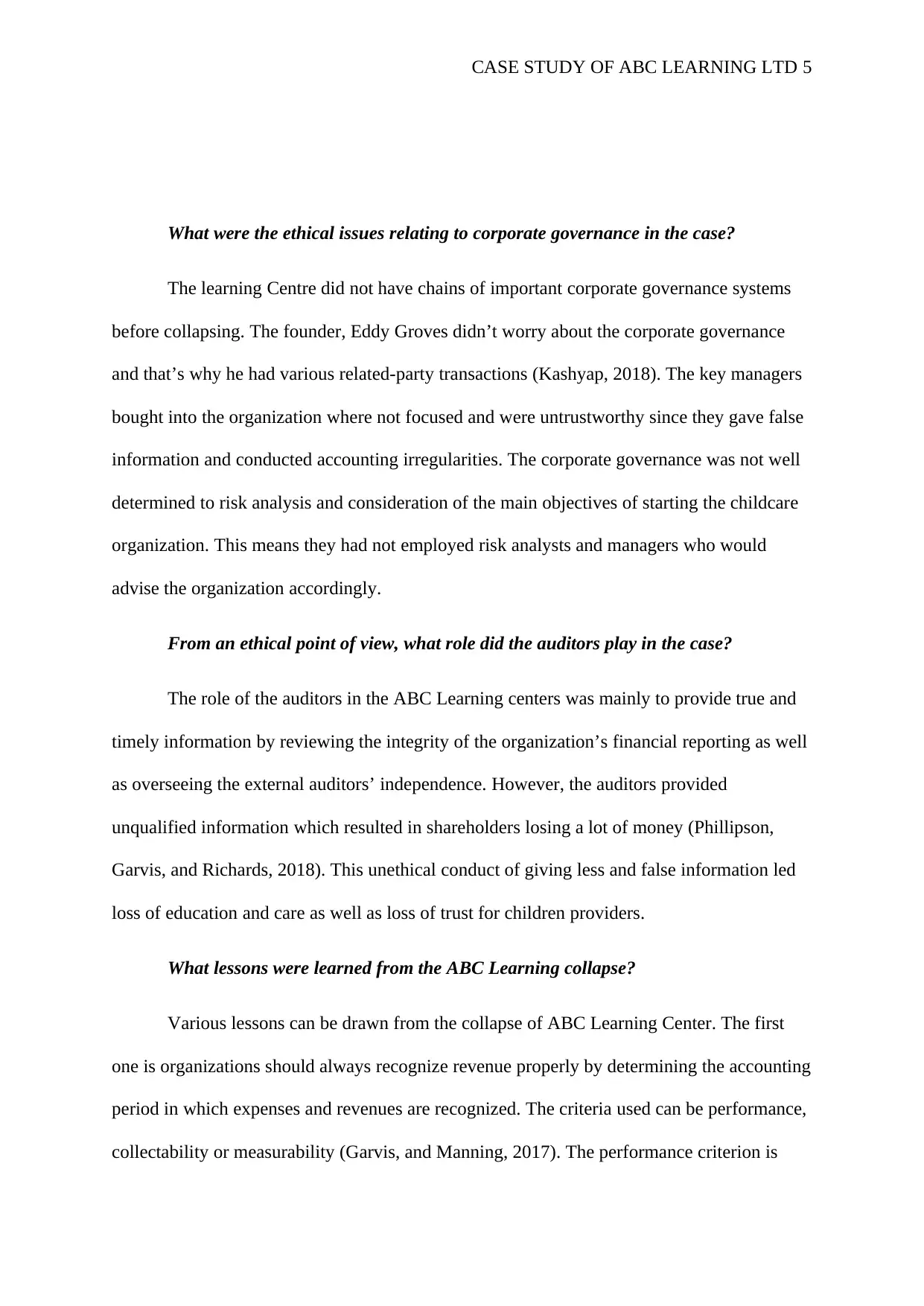
CASE STUDY OF ABC LEARNING LTD 5
What were the ethical issues relating to corporate governance in the case?
The learning Centre did not have chains of important corporate governance systems
before collapsing. The founder, Eddy Groves didn’t worry about the corporate governance
and that’s why he had various related-party transactions (Kashyap, 2018). The key managers
bought into the organization where not focused and were untrustworthy since they gave false
information and conducted accounting irregularities. The corporate governance was not well
determined to risk analysis and consideration of the main objectives of starting the childcare
organization. This means they had not employed risk analysts and managers who would
advise the organization accordingly.
From an ethical point of view, what role did the auditors play in the case?
The role of the auditors in the ABC Learning centers was mainly to provide true and
timely information by reviewing the integrity of the organization’s financial reporting as well
as overseeing the external auditors’ independence. However, the auditors provided
unqualified information which resulted in shareholders losing a lot of money (Phillipson,
Garvis, and Richards, 2018). This unethical conduct of giving less and false information led
loss of education and care as well as loss of trust for children providers.
What lessons were learned from the ABC Learning collapse?
Various lessons can be drawn from the collapse of ABC Learning Center. The first
one is organizations should always recognize revenue properly by determining the accounting
period in which expenses and revenues are recognized. The criteria used can be performance,
collectability or measurability (Garvis, and Manning, 2017). The performance criterion is
What were the ethical issues relating to corporate governance in the case?
The learning Centre did not have chains of important corporate governance systems
before collapsing. The founder, Eddy Groves didn’t worry about the corporate governance
and that’s why he had various related-party transactions (Kashyap, 2018). The key managers
bought into the organization where not focused and were untrustworthy since they gave false
information and conducted accounting irregularities. The corporate governance was not well
determined to risk analysis and consideration of the main objectives of starting the childcare
organization. This means they had not employed risk analysts and managers who would
advise the organization accordingly.
From an ethical point of view, what role did the auditors play in the case?
The role of the auditors in the ABC Learning centers was mainly to provide true and
timely information by reviewing the integrity of the organization’s financial reporting as well
as overseeing the external auditors’ independence. However, the auditors provided
unqualified information which resulted in shareholders losing a lot of money (Phillipson,
Garvis, and Richards, 2018). This unethical conduct of giving less and false information led
loss of education and care as well as loss of trust for children providers.
What lessons were learned from the ABC Learning collapse?
Various lessons can be drawn from the collapse of ABC Learning Center. The first
one is organizations should always recognize revenue properly by determining the accounting
period in which expenses and revenues are recognized. The criteria used can be performance,
collectability or measurability (Garvis, and Manning, 2017). The performance criterion is
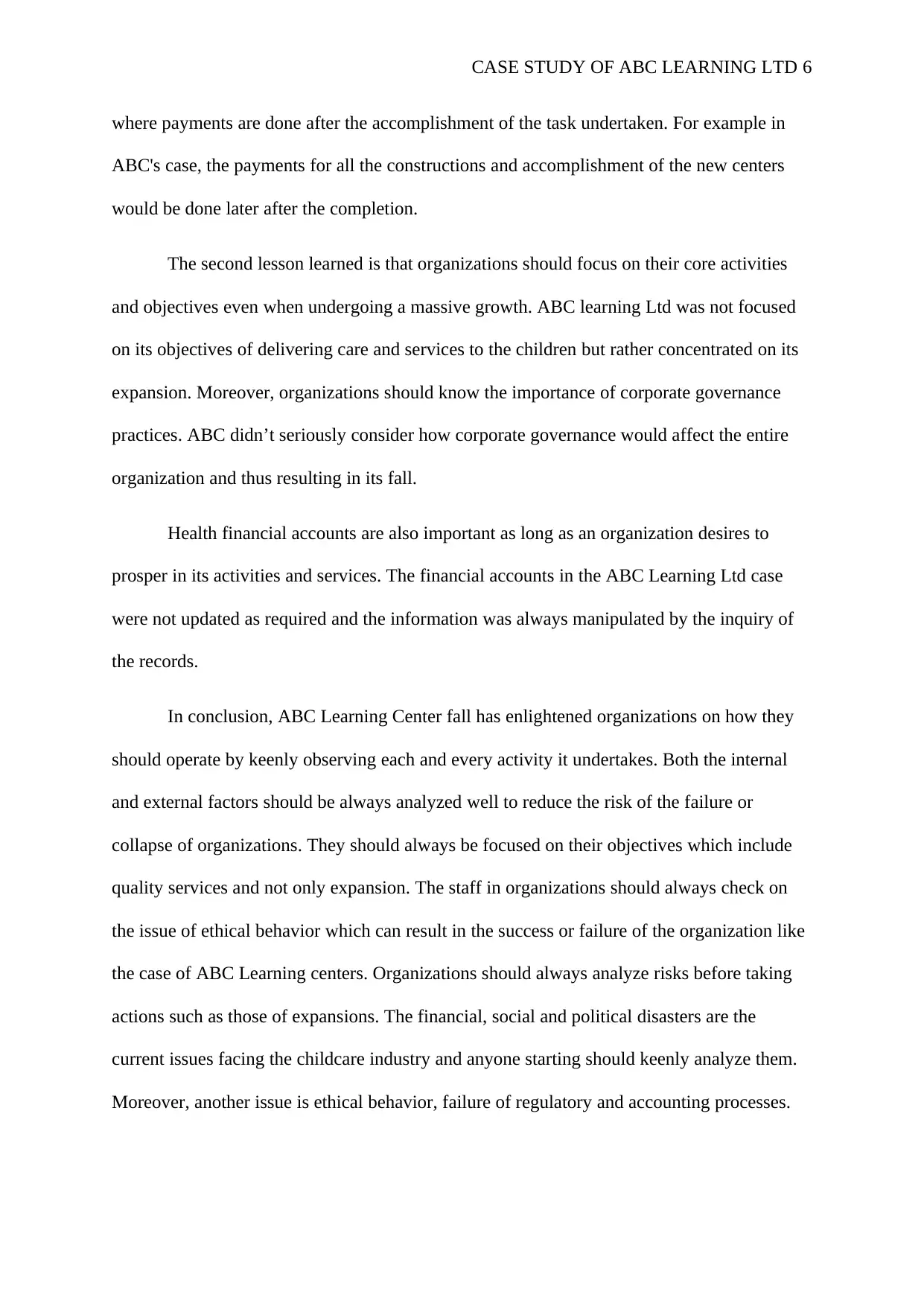
CASE STUDY OF ABC LEARNING LTD 6
where payments are done after the accomplishment of the task undertaken. For example in
ABC's case, the payments for all the constructions and accomplishment of the new centers
would be done later after the completion.
The second lesson learned is that organizations should focus on their core activities
and objectives even when undergoing a massive growth. ABC learning Ltd was not focused
on its objectives of delivering care and services to the children but rather concentrated on its
expansion. Moreover, organizations should know the importance of corporate governance
practices. ABC didn’t seriously consider how corporate governance would affect the entire
organization and thus resulting in its fall.
Health financial accounts are also important as long as an organization desires to
prosper in its activities and services. The financial accounts in the ABC Learning Ltd case
were not updated as required and the information was always manipulated by the inquiry of
the records.
In conclusion, ABC Learning Center fall has enlightened organizations on how they
should operate by keenly observing each and every activity it undertakes. Both the internal
and external factors should be always analyzed well to reduce the risk of the failure or
collapse of organizations. They should always be focused on their objectives which include
quality services and not only expansion. The staff in organizations should always check on
the issue of ethical behavior which can result in the success or failure of the organization like
the case of ABC Learning centers. Organizations should always analyze risks before taking
actions such as those of expansions. The financial, social and political disasters are the
current issues facing the childcare industry and anyone starting should keenly analyze them.
Moreover, another issue is ethical behavior, failure of regulatory and accounting processes.
where payments are done after the accomplishment of the task undertaken. For example in
ABC's case, the payments for all the constructions and accomplishment of the new centers
would be done later after the completion.
The second lesson learned is that organizations should focus on their core activities
and objectives even when undergoing a massive growth. ABC learning Ltd was not focused
on its objectives of delivering care and services to the children but rather concentrated on its
expansion. Moreover, organizations should know the importance of corporate governance
practices. ABC didn’t seriously consider how corporate governance would affect the entire
organization and thus resulting in its fall.
Health financial accounts are also important as long as an organization desires to
prosper in its activities and services. The financial accounts in the ABC Learning Ltd case
were not updated as required and the information was always manipulated by the inquiry of
the records.
In conclusion, ABC Learning Center fall has enlightened organizations on how they
should operate by keenly observing each and every activity it undertakes. Both the internal
and external factors should be always analyzed well to reduce the risk of the failure or
collapse of organizations. They should always be focused on their objectives which include
quality services and not only expansion. The staff in organizations should always check on
the issue of ethical behavior which can result in the success or failure of the organization like
the case of ABC Learning centers. Organizations should always analyze risks before taking
actions such as those of expansions. The financial, social and political disasters are the
current issues facing the childcare industry and anyone starting should keenly analyze them.
Moreover, another issue is ethical behavior, failure of regulatory and accounting processes.
⊘ This is a preview!⊘
Do you want full access?
Subscribe today to unlock all pages.

Trusted by 1+ million students worldwide
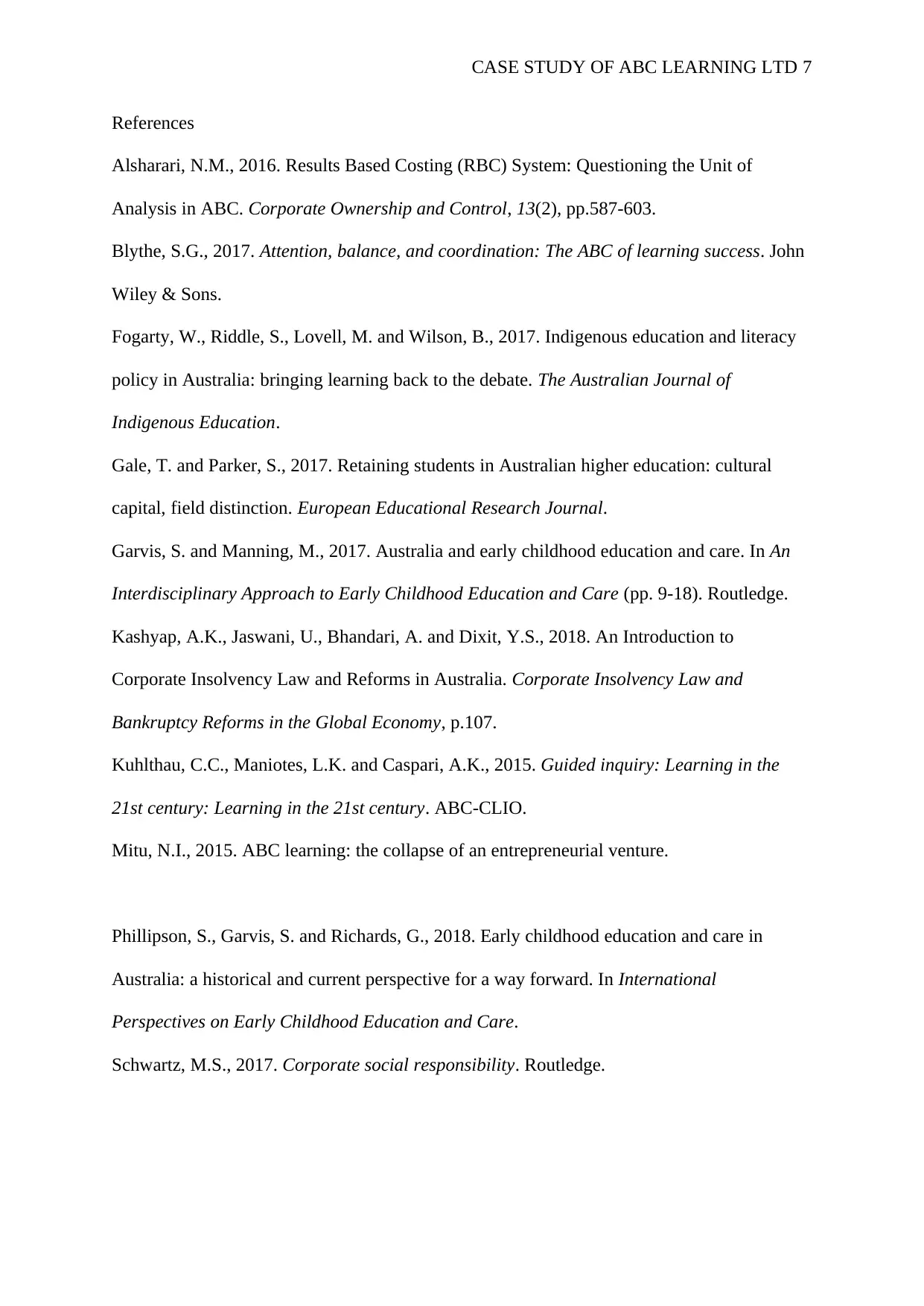
CASE STUDY OF ABC LEARNING LTD 7
References
Alsharari, N.M., 2016. Results Based Costing (RBC) System: Questioning the Unit of
Analysis in ABC. Corporate Ownership and Control, 13(2), pp.587-603.
Blythe, S.G., 2017. Attention, balance, and coordination: The ABC of learning success. John
Wiley & Sons.
Fogarty, W., Riddle, S., Lovell, M. and Wilson, B., 2017. Indigenous education and literacy
policy in Australia: bringing learning back to the debate. The Australian Journal of
Indigenous Education.
Gale, T. and Parker, S., 2017. Retaining students in Australian higher education: cultural
capital, field distinction. European Educational Research Journal.
Garvis, S. and Manning, M., 2017. Australia and early childhood education and care. In An
Interdisciplinary Approach to Early Childhood Education and Care (pp. 9-18). Routledge.
Kashyap, A.K., Jaswani, U., Bhandari, A. and Dixit, Y.S., 2018. An Introduction to
Corporate Insolvency Law and Reforms in Australia. Corporate Insolvency Law and
Bankruptcy Reforms in the Global Economy, p.107.
Kuhlthau, C.C., Maniotes, L.K. and Caspari, A.K., 2015. Guided inquiry: Learning in the
21st century: Learning in the 21st century. ABC-CLIO.
Mitu, N.I., 2015. ABC learning: the collapse of an entrepreneurial venture.
Phillipson, S., Garvis, S. and Richards, G., 2018. Early childhood education and care in
Australia: a historical and current perspective for a way forward. In International
Perspectives on Early Childhood Education and Care.
Schwartz, M.S., 2017. Corporate social responsibility. Routledge.
References
Alsharari, N.M., 2016. Results Based Costing (RBC) System: Questioning the Unit of
Analysis in ABC. Corporate Ownership and Control, 13(2), pp.587-603.
Blythe, S.G., 2017. Attention, balance, and coordination: The ABC of learning success. John
Wiley & Sons.
Fogarty, W., Riddle, S., Lovell, M. and Wilson, B., 2017. Indigenous education and literacy
policy in Australia: bringing learning back to the debate. The Australian Journal of
Indigenous Education.
Gale, T. and Parker, S., 2017. Retaining students in Australian higher education: cultural
capital, field distinction. European Educational Research Journal.
Garvis, S. and Manning, M., 2017. Australia and early childhood education and care. In An
Interdisciplinary Approach to Early Childhood Education and Care (pp. 9-18). Routledge.
Kashyap, A.K., Jaswani, U., Bhandari, A. and Dixit, Y.S., 2018. An Introduction to
Corporate Insolvency Law and Reforms in Australia. Corporate Insolvency Law and
Bankruptcy Reforms in the Global Economy, p.107.
Kuhlthau, C.C., Maniotes, L.K. and Caspari, A.K., 2015. Guided inquiry: Learning in the
21st century: Learning in the 21st century. ABC-CLIO.
Mitu, N.I., 2015. ABC learning: the collapse of an entrepreneurial venture.
Phillipson, S., Garvis, S. and Richards, G., 2018. Early childhood education and care in
Australia: a historical and current perspective for a way forward. In International
Perspectives on Early Childhood Education and Care.
Schwartz, M.S., 2017. Corporate social responsibility. Routledge.
1 out of 7
Related Documents
Your All-in-One AI-Powered Toolkit for Academic Success.
+13062052269
info@desklib.com
Available 24*7 on WhatsApp / Email
![[object Object]](/_next/static/media/star-bottom.7253800d.svg)
Unlock your academic potential
Copyright © 2020–2026 A2Z Services. All Rights Reserved. Developed and managed by ZUCOL.





